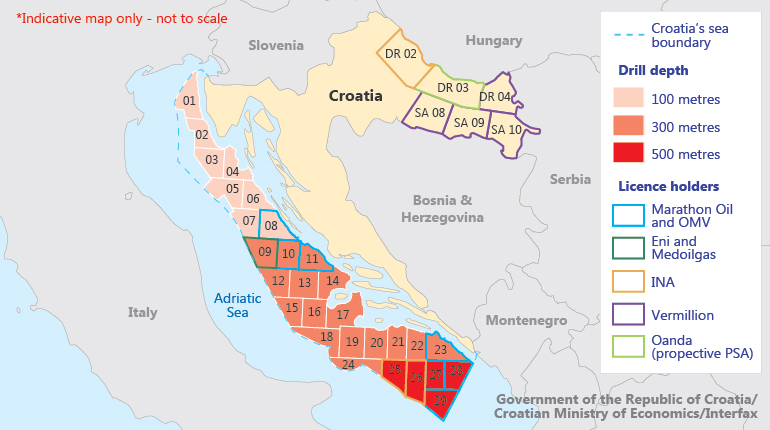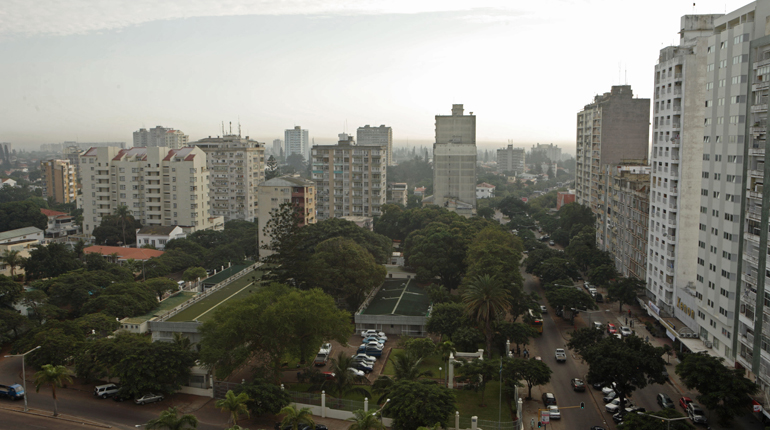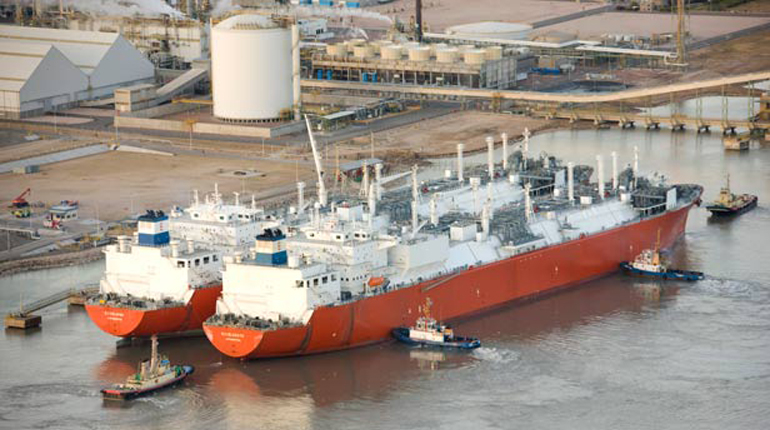 Croatia’s onshore and offshore licence areas.
Croatia’s onshore and offshore licence areas.
The dissolution of Croatia’s parliament on Monday just days after outgoing Prime Minister Tihomir Oreškovic signed off on new production-sharing agreements (PSAs) places doubts over the future of the country’s exploration and production sector.
The government initially awarded the six onshore licence areas last June, with politics already playing a role in delaying progress, according to analysts.
"The main reasons for the delay were political changes in Croatia over the past year. Further development of the project, in my opinion, will depend on the outcome of the elections," Ivana Manovelo, a partner at law firm Macesic & Partners in Croatia, told Interfax Natural Gas Daily.
A toxic mix of personality clashes and conflicts of interest saw the conservative Croatian Democratic Union (HDZ) launch a vote of no-confidence in the national parliament that brought down Oreškovic and will see new elections this autumn.
Part of the controversy stems from an alleged conflict of interest between the HDZ’s leader Tomislav Karamarko and Hungary’s state oil company MOL, which has been locked in dispute for many years with the Croatian government over its stake in national oil company INA.
Karamarko’s wife is alleged to have been paid a consultancy fee by a lobbyist in turn paid by MOL. The controversy re-emphasises the difficult relationship between the two owners of INA – Croatia’s dominant producer until the previous left-wing government launched its first international tender process.
In presenting the onshore PSAs this month, Oreškovic claimed the deals were essential to prolong the life of Croatia’s troubled exploration industry. "These agreements will ensure the future of an industry that has already had a decisive role in Croatia’s economic development," Oreškovic said.
An earlier offshore tender round awarded blocks to Marathon Oil and OMV, but the companies opted out, citing the unresolved border dispute between Croatia and Montenegro. However, analysts point to other factors at play.
"Croatia’s dispute with Montenegro over the border may influence investments in the most southern offshore zones, but there are still a number of blocks in other Croatian parts of the Adriatic," Manovelo said. Heather Forgan, a senior research analyst at Wood Mackenzie, noted that the maritime dispute had been there during the bidding phase.
"It is important to note that this was an outstanding issue when the licensing round was opened. Unsuccessful attempts to renegotiate the contract terms [in the] lower oil price environment and the overall inertia surrounding the regional environmental impact exercise, will have also been key components."
"We have seen companies plan to cut around 30% from global upstream investment in 2016, with much of this being met by slashing exploration budgets, particularly in frontier areas like the deepwater Adriatic," Forgan said.
She added that Croatia’s onshore acreage should prove a safer bet.
"Onshore exploration in Croatia is less likely to be impacted as it viewed as a less risky investment: there are proven hydrocarbon plays in the Pannonian Basin, onshore drilling costs are lower and commercialisation of any discoveries will be easier and cheaper," Forgan said.
Economic boost
The government is estimating a boon to the Croatian economy of €88 million ($100 million) during the onshore exploration phase alone, while total net revenue if exploration turns into production work could be HRK 3.4-6.8 billion ($510 million-1 billion) per year.
"Apart from the direct revenue for the state budget, strategic importance is reflected in the fact that the production of oil and gas can provide energy security and independence of the Republic of Croatia and bring significant benefits to the economy," the Croatian Hydrocarbon Agency said in a statement.
INA will also get its chance to start on a new exploration project after its licence concessions in the region were revoked by the Economy Ministry in 2011.
"An opportunity to start a new cycle of investments in exploration of new fields and to expand our portfolio was opened for us. It is of course essential for the growth of our company, but also the entire Croatian economy," Zoltán Áldott, president of INA, said in a statement.
"When, in 2011, we lost our exploration concession, opportunities were very limited. However, we managed to optimise existing production fields and increase production, and in doing this we have shown that we have the knowledge and experience and we believe in success in this project as well," Áldott said.








Talk to us
Natural Gas Daily welcomes your comments. Email us at [email protected].